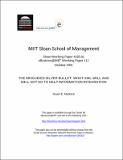| dc.description.abstract | The eXtensible Markup Language (XML) offers many important benefits and
improvements over its predecessor, HTML. But, articles have appeared about XML
with exaggerated claims of it being a "Rosetta Stone" with "miraculuous ways" to
almost automatically provide information integration. These claims are actually being
believed by some executives. It is almost surprising that no one has claimed that XML
can cure cancer and provide world peace! In reality, XML must face many of the
same challenges that plagued Electronic Data Interchange (EDI) and database
integration efforts of the past. To a large extent, there are both managerial and
technical challenges - much related to the difficulties of attaining universally accepted
semantically-rich standards. In this paper, these challenges will be discussed with
specific emphasis on the issue of dealing with a real-world with multiple "contexts."
Some promising research directions, some overlapping with the "semantic web" effort,
will be presented. | en |
